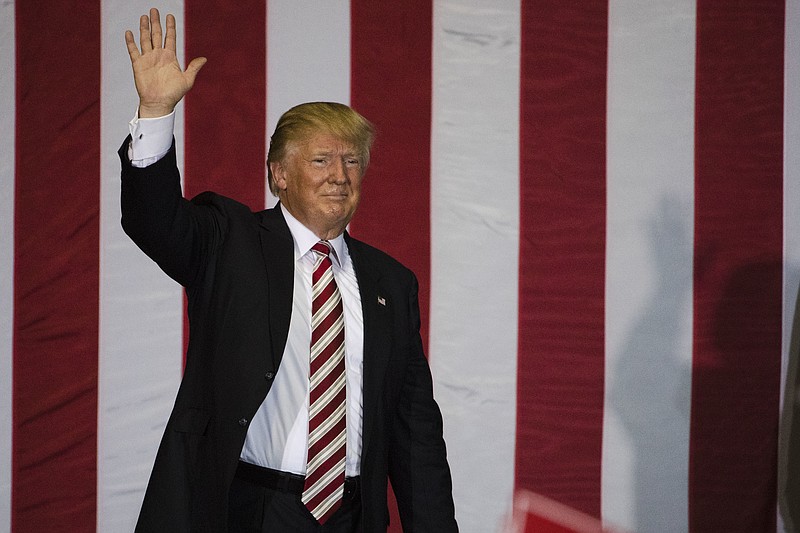While I cannot verify its provenance, the following appears to be my Sunday column from Nov. 8, 2020, which slipped through a small rift in the space-time continuum while I was writing a panicked "It's the Trump Apocalypse!" column this week.
I should have seen it coming.
Throughout the 2016 election - remember those crazy times? - I tried to draw a distinction between Donald Trump's strategy and the man himself. In the primaries I thought that Trump's pitch to working-class voters, his breaks with Republican orthodoxy on economic and foreign policy, were often politically brilliant... but that Trump himself was too much of a loose cannon to actually win the party's nomination.
When that assumption was proved wrong, I thought that Trump's general-election strategy of going hard after Rust Belt votes had the potential to split the Obama coalition... but that his obvious sexism and white-identity appeals would alienate women and drive minority turnout too high for him to win.
Well, that was wrong, too. Which left me with my assumptions about a Trump administration: that in theory an ideologically flexible president promising a national-interest-first foreign policy could be remarkably popular, but that in practice Trump would give us economic weakness, global instability and domestic upheaval.
Yet here we are four years later, watching Trump bask in the glow of an easy re-election over the Warren-Booker Democratic ticket. And given how successfully he defied expectations all through 2016, the path he's taken to this point probably shouldn't have come as such a surprise.
First, there was no economic slump. The jitters that Trump's ascent induced were swamped by the market's eagerness for fiscal stimulus - a policy course that (ironically enough) prominent liberal pundits had urged for years, and that the Trump era swiftly provided.
Trump's Keynesianism was mostly defense spending and tax cuts, but it included a huge infrastructure push - soon nicknamed "TrumpWorks" - that doubled as a jobs program for his core constituency, blue-collar men.
Trump also turned out to be good at bipartisan maneuvering. Well aware that Paul Ryan and Mitch McConnell had held their noses to support him, he quickly promised Chuck Schumer major input on a few key domestic issues. Trump's supply-side tax cuts passed on a party-line vote, but his infrastructure bill passed with a motley bipartisan coalition. So did a bill mixing child-care subsidies and child tax credits, which became more middle-class-friendly after Ivanka and Schumer hammered out the details.
Other right-wing priorities have fared better, especially on energy and financial deregulation, and the Democrats have found some political footing attacking Trump's coziness with Wall Street. But overall he has afforded them fewer targets than they expected.
Somehow Kellyanne Conway, "counselor to the president" and all-purpose Svengali, has persuaded him to tiptoe around racial politics and simply ignore the constant left-wing protests, which has increased the protests' fury, but also their unpopularity.
Meanwhile his obvious lack of interest in social conservatism has enabled Trump to effectively decentralize the culture wars. His Supreme Court appointments (Mike Lee to fill the Scalia seat, Ted Cruz to replace a retiring Clarence Thomas) have simply kept the court's Obama-era balance intact; Ruth Bader Ginsburg and Stephen Breyer keep taking their vitamins and declining to retire.
Finally, in foreign policy, Trump has delivered what he promised: A brutal realpolitik, built around détente with Russia and China (the promised trade war turned out to be mostly rhetoric) and a ruthless focus on counterterrorism. Crimea has been ceded to Russia and Ukraine left to fend for itself, U.S. rhetoric about democracy promotion has all but disappeared, and a concert of U.S.-backed strongmen are grinding away at Islamists from North Africa to Iraq. Since the fall of Raqqa and the capture of Abu Bakr al-Baghdadi, ISIS has become a stateless terror group, claiming credit for a series of small-scale attacks but nothing at a 9/11 level, which has enabled Trump to declare constantly that he has radical Islam "on the run."
So his second term could still look like the disaster that I and so many others feared would arrive in his first one. But here in the fall of 2020, halfway through the Trump era, we also need to reckon with reality: By charting the same distinctive ideological course he followed in his strange political ascent, President Trump's campaign-trail boast - "folks, I made America great again" - is one that a majority of Americans understandably believe.
The New York Times
